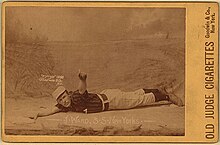That's a good explanation.
"A great variety of morbid symptoms appear."
College sports in the US is in the same situation. Nobody is entirely - or, in some cases, at all - happy with the current set-up*, but changing it would require taking away money or power or opportunities from people who currently have it, and nobody is willing to give up what they have for the chance of something better especially if it's mostly somebody else that will benefit.
*Except, perhaps, the bookies.
"A great variety of morbid symptoms appear."
College sports in the US is in the same situation. Nobody is entirely - or, in some cases, at all - happy with the current set-up*, but changing it would require taking away money or power or opportunities from people who currently have it, and nobody is willing to give up what they have for the chance of something better especially if it's mostly somebody else that will benefit.
*Except, perhaps, the bookies.


Comment